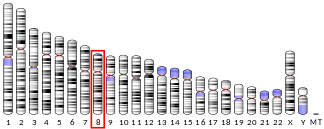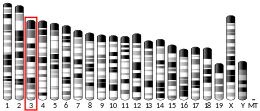Fatty acid binding protein 9, testis is a protein that in humans is encoded by the FABP9 gene.[5]
Further reading
- Stejskal D, Karpisek M, Bronsky J (2008). "Serum adipocyte-fatty acid binding protein discriminates patients with permanent and temporary body weight loss". Journal of Clinical Laboratory Analysis. 22 (5): 380–2. doi:10.1002/jcla.20270. PMID 18803274.
- Oko R, Morales CR (Nov 1994). "A novel testicular protein, with sequence similarities to a family of lipid binding proteins, is a major component of the rat sperm perinuclear theca". Developmental Biology. 166 (1): 235–45. doi:10.1006/dbio.1994.1310. PMID 7958448.
- Vega A, Salas A, Milne RL, Carracedo B, Ribas G, Ruibal A, de León AC, González-Hernández A, Benítez J, Carracedo A (Jan 2009). "Evaluating new candidate SNPs as low penetrance risk factors in sporadic breast cancer: a two-stage Spanish case-control study". Gynecologic Oncology. 112 (1): 210–4. doi:10.1016/j.ygyno.2008.09.012. PMID 18950845.
- Shen WJ, Sridhar K, Bernlohr DA, Kraemer FB (May 1999). "Interaction of rat hormone-sensitive lipase with adipocyte lipid-binding protein". Proceedings of the National Academy of Sciences of the United States of America. 96 (10): 5528–32. doi:10.1073/pnas.96.10.5528. PMC 21893. PMID 10318917.



